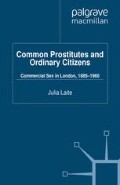Abstract
Nellie Johnson began working as a street prostitute in London sometime during the First World War, a few short years after Lydia Harvey headed homeward on her New Zealand-bound passenger liner. Johnson was first arrested on 6 November 1916, when she was twenty-two years old, and, if she was anything like most of the women who sold sex on the streets of the metropolis, she had probably not gone much more than a year between first soliciting prostitution and finding herself under arrest for doing so.1 But it is difficult to know anything at all about Johnson before her first encounter with the criminal justice system and its record-keepers: the census reports fifty Nellie Johnsons who were around seven years old in 1901 and she could have been any of them. Perhaps she was the Nellie Johnson born in Whitstable, Kent, in 1894; she did go to nearby Chatham, after all, a few years after her first arrest, perhaps seeking old contacts.2 She also could have been Nellie Johnson the orphan, who was born in Camberwell in 1893, a part of South London coloured light blue (‘very poor, chronic want’) by Charles Booth a year before her birth.3 By the age of seven this Nellie Johnson was living at the Brixton Orphanage for 300 Fatherless Girls, an institution founded in 1876 that had as its express mission the training of girls for domestic service.4
Access this chapter
Tax calculation will be finalised at checkout
Purchases are for personal use only
Preview
Unable to display preview. Download preview PDF.
Notes
John Lane, ed., Herbert Fry’s Royal Guide to the London Charities (London, 1917), p. 29.
Clive Emsley, ‘Sergeant Goddard: The Story of a Rotten Apple, or a Diseased Orchard?’ in Crime and Culture: An Historical Perspective, eds Amy Gilman Srebnick and René Levy (London, 2005), p. 86.
Copyright information
© 2012 Julia Laite
About this chapter
Cite this chapter
Laite, J. (2012). Making War, Taking Fingerprints and Challenging the Law: Policy Changes and Public Debates after 1914. In: Common Prostitutes and Ordinary Citizens. Genders and Sexualities in History. Palgrave Macmillan, London. https://doi.org/10.1057/9780230354210_8
Download citation
DOI: https://doi.org/10.1057/9780230354210_8
Publisher Name: Palgrave Macmillan, London
Print ISBN: 978-1-349-31151-4
Online ISBN: 978-0-230-35421-0
eBook Packages: Palgrave History CollectionHistory (R0)

